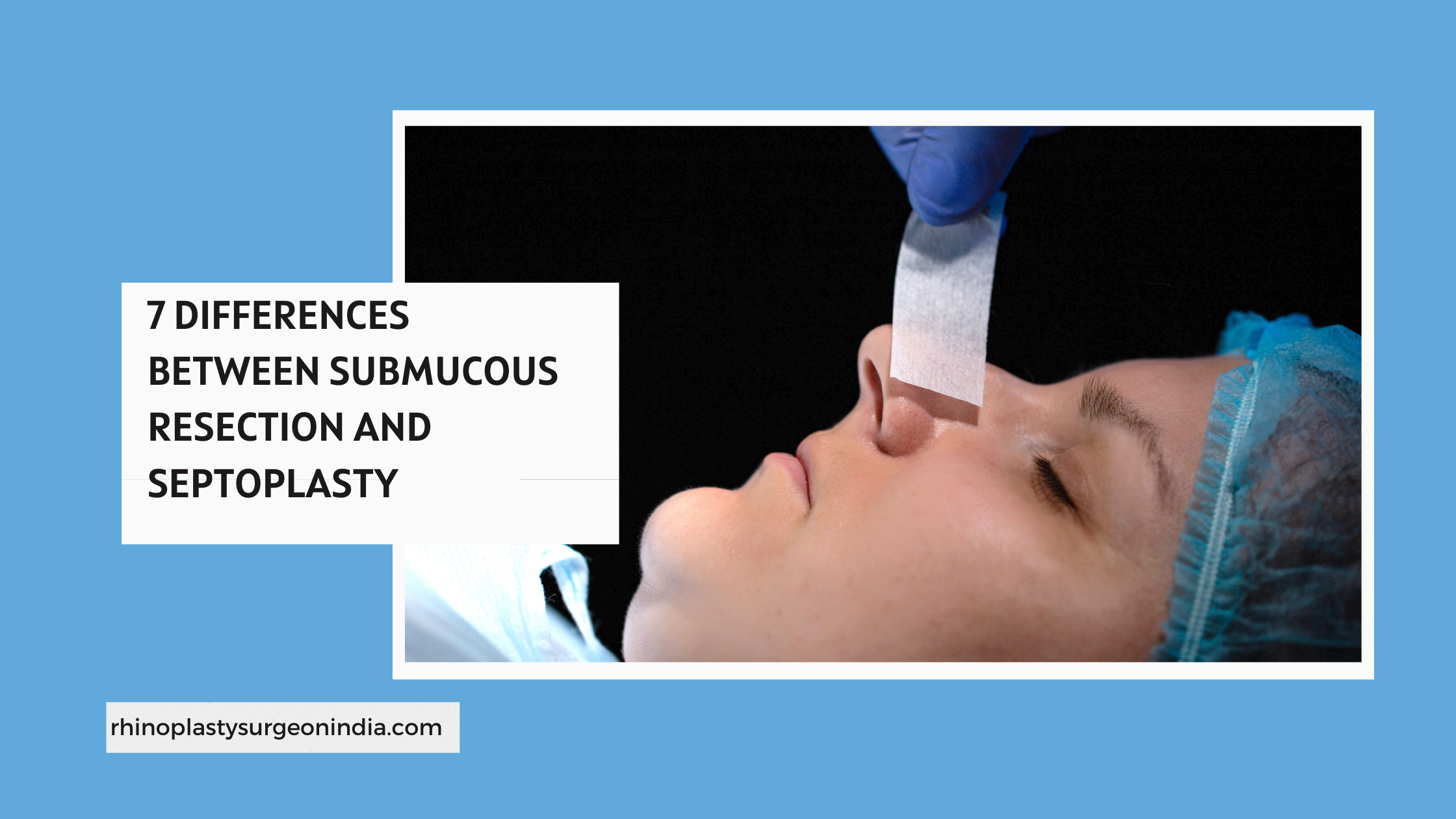Submucous resection and septoplasty are simple but highly technical rhinoplasty procedures aiming to correct the deviated septum. A deviated septum is a widespread problem; many people can go through their life without it being a bother. However, some do feel severe symptoms of the deviated or crooked nose septum and both functional and cosmetic aspects necessitating surgical intervention by an expert rhinology surgeon.
What is the nasal septum?
The septum is a vital cartilage piece that ideally should divide the insides of the nose into two equal compartments. However, when bent, it can cause crookedness in the nose and other problems.
You may not even know you have a deviated septum; however, a few septals can be problematic when they cause any of the following symptoms.
- Obstruction in the nostrils (one or both): When the septum blocks a nostril, it can make it difficult to do normal breathing. This blockage becomes more pronounced when you suffer from a cold or a nasal allergy because the nasal passages swell and narrow.
- Nose bleeds: because of the crookedness, the nasal septum can become dry and increase nosebleeds.
- Pain in the face: This symptom is usually observed in cases of deviation. The surfaces within the nose touch cause pressure to one side of the face, leading to pain.
- Snoring and noisy breathing when sleeping: A deviated septum in your nose causes the airways not able to pass the air properly, and it causes loud and bothersome breathing during sleep.
- Alertness towards the nasal cycle: the natural nasal process compromises obstruction on one side and then to the other. Because of nasal obstruction, people with a deviated septum are often aware of this cycle.
- Preferring sleeping on one side: People with narrow nasal passages tend to sleep on one side to optimize breathing through the nose and make sleeping and everyday work more comfortable.
- Nasal congestion: Sometimes, it feels like there is always something inside the nose, and it feels uncomfortable. This can also cause the problem of sleep apnea, in which the breathing automatically starts or stops.
- Sinusitis: Inflammatory changes in the nasal canal and the sinus tissues make it difficult for nostrils to drain correctly; hence, the fluid accumulates in the sinus cavity, leading to chronic pain and pressure, leading to sinusitis.
The deviated septum can be caused because of many things, such as congenital disabilities, injury, or trauma to the nose because of rough play or contact sports. In adults, the most common cause of a deviated septum is a direct injury to the nose. The deviated septum can worsen as we age, leading to more issues. The two most common nose surgeries done to alleviate the deviated septum symptoms are septoplasty and submucosal resection. The selection of the surgery depends on the type of deviation. Septum deviation is classified into five types.
Surgical management of the deviated septum is a challenging surgery that needs the best rhinologic surgeons who are experts in aesthetics and functional failures caused before and post-surgery. In the last few years, the surgery for a deviated septum has seen many modifications to preserve the septal framework. The diagnosis for both submucous resection and septoplasty needs a detailed analysis of the nasal skeleton and its shape with the rest of the facial structure.
Both surgeries aim to correct the septum inside the nose to promote better breathing and make the nose straighter. This makes both work and personal life better for the patients. However, they differ in various aspects, such as
- Surgical technique: The septoplasty aims to straighten the deviated septum, and the resection technique removes the extra tissues (enlarged nose’s inferior turbinates) from the septum to open up the airways. SMR (submucous resection) removes the deviated septum or decreases the sign of external deviation. In SMR, the surgeon accesses the septum by elevating the flaps on both sides, but in Septorhinoplasty, the flaps are lifted from the concave side of the nose.
- Type of surgery: SMR is a radial surgery with a large amount of tissue excavation and removal, whereas septoplasty is a conservative surgery with minimum tissue removal.
- Endonasal or external: Submucous resection to correct the nasal deviation is performed through an open rhinoplasty, and septoplasty or the Septorhinoplasty can be done through open nose surgery.
- Age of surgery: SMR can only be done on children above 17 when the bones and cartilage have stopped growing, whereas septoplasty can be done on children also to give them immediate relief.
- Cartilage: The septoplasty aims to preserve as much nose cartilage as possible, but in SMR, the nose loses most of this cartilage.
- Revision rhinoplasties: Since the submucous resection removes most of the nasal cartilage, it is difficult to perform another surgery after this type of deviation correction, however in cases of Septorhinoplasty, the rhinoplasty surgeon can do another surgery
- Changes to the external structure of the nose: SMR does not change the nose’s appearance, but Septorhinoplasty can give you a straighter-looking nose.
Submucous resection for correcting deviated septum procedure
The SMR is a highly successful procedure that reduces the size of the inferior turbinate in the nose. The primary function of turbinates is to keep the air we breathe humidified and warm and make breathing easier. Each side of the nose has tree turbinates. When the turbinate near the bottom of the nose enlarges, it can cause breathing difficulties. Also, when the deviated septum cannot be treated in other ways and is causing disruptions in the patient’s everyday life, then SMR becomes the suitable option for a long time and immediate relief. Here are some essential things to know about submucous resection surgery of nasal septum
- It is a one-day procedure; in most cases, there is no need to stay in the hospital overnight.
- The surgeon will use local or general anesthesia, and the surgery takes only about 1.5 hours to complete
- The surgeon makes small incisions in the nose and then slices up the extra tissue. This operation does not disrupt the mucus lining.
- Then the surgeon will close the incisions, and you are on your way to recovery. There is no visible external scar on the outside of the nose.
When does a rhinoplasty surgeon recommend submucosal resection?
SMR is not a necessary surgery for a deviated septum, but a nose surgeon will recommend an SMR if you want relief from
- Chronic sinus infections that have not responded to traditional treatments
- Nose bleeds because of septal deviation
- Difficulty in breathing because of a crooked septum
This surgery can also be combined with routine sinus surgery to give the surgeon better access to other parts of the nose. SMR is also done as a part of cleft palate repair.
Cost of septoplasty and submucous resection of the nasal septum
Since both surgeries do different corrections, their price is different than each other. the cost of SMR and septoplasty is dependent on
- Surgeon’s expertise and experience
- Location of the clinic
- Any further corrections are done alongside it if necessary.
- Anesthesia and hospitalization fees
When the procedure is done for functional reasons, it is generally covered by insurance; therefore, you should talk to your insurance provider and check.

